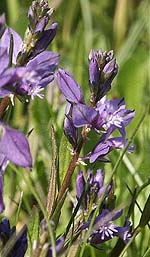Polygala Root

Polygala root is a traditional Chinese medicinal herb that is effective
mainly as an expectorant (releaser of mucous) and a stimulant for bronchial
asthma. But it's also capable of treating boils and carbuncles (similar
to boils but larger and with more pustules), and the herb is even thought
to have many will-strengthening properties, such as helping a person to
stop smoking, prevention of overeating, and even helping to fight drug
addiction.
The Latin name for polygala root is "radix polygalae" and its
Chinese name "yuan zhi". It is found growing in meadows and
on hillsides in Eastern Asia, mainly in China, Korea, and Mongolia. Polygala
is prepared in a common way for herbs: dug out of the ground, the fibrous
roots extracted and washed with water, then dried in the sun. After preparation
the roots are gray-yellow to gray-brown in color with many wrinkles; they
are also hard in texture and break easily. Polygala is said to have a
bitter taste and a mild odor.
Other claims made for the herb are that it helps with kidney ailments,
relieves insomnia, fights breast pain and breast swelling, improves vision,
enhances auditory senses and also strengthens the body. Polygala has even
been used to treat epilepsy.
The herb's hypnotic and tranquilizing effects are thought to help control
heart palpitations, prevent mood swings, relieve anxiety, fight depression,
eliminate forgetfulness, and enhance overall mental processes, thus making
it a mild nootropic.
In traditional Chinese medicine polygala root is regularly combined with
a variety of other herbs (wild jujube seed, apricot seed, ginseng, licorice
root, dragon's bone, etc.) to relieve various ailments.
Certain nasal inhaler products are currently being marketed with polygala
root acting as the main ingredient to allow a person to stop smoking.
The person inhales the aroma of the herb and it changes the way their
brain processes the taste of a cigarette, making it unpleasant to the
user; the aroma also acts on the brain in other ways to eliminate the
initial craving for tobacco. Studies in China showed that people who used
these nasal inhalers with polygala root as the main ingredient have a
success rate of over 90% for quitting smoking.
Be warned that polygala root should be used with caution (or not at all!)
by people with gastritis or a gastric ulcer.
|